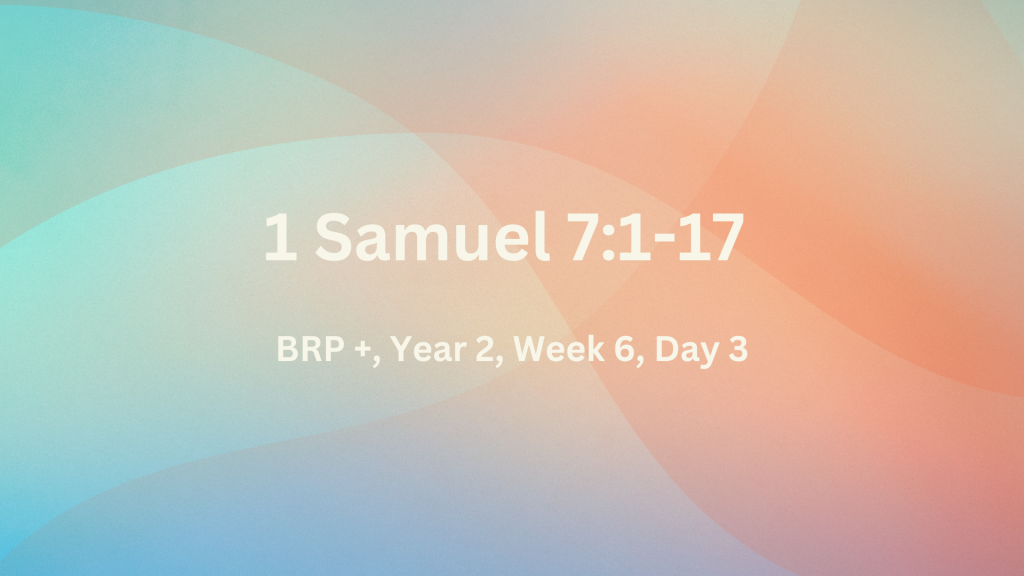1 Samuel 7:1-17
Q.1. Where was the Ark located? How long was it there? Who looked after it? How did Israel fare during that time? What challenge did Samuel give the people? – (1 Sam.7:1-4 c.f. Josh.15:13; 18:14)
The Ark of the Covenant was taken to the house of Abinadab at Kiriath-jearim, on the border of Judah and Benjamin (c.f. Josh.15:13; 18:14). They consecrated his son, Eleazar to care for it. Eleazar would have been a Levite. This he did faithfully for 20 years, and the Lord blessed his family (1 Sam.7:1-2 c.f. 2 Sam.6:12). [When David sought to bring the Ark from Kiriath-jearim with tragic consequences, Abinadab’s other sons Uzzah and Ahio were involved c.f. 2 Sam.6:2]. All the while, Israel was pining for the Ark (1 Sam.7:2). The sense of loss was great enough for Samuel to use it as a teachable moment to challenge all the tribes – If you return to the Lord with all your heart, remove the foreign gods and the Ashtaroth from among you and direct your hearts to the Lord and serve Him alone; and He will deliver you from the hand of the Philistine – (1 Sam.7:3). They did as Samuel advised and removed their idols – and served the Lord alone (1 Sam.7:4).
Q.2. What made the consecration at Mizpah crucial? How were their actions understood by the Philistines? What did the Israelites do? How did God answer Samuel’s intercession? – (1 Sam.7:5-11)
Samuel followed up by gathering all Israel to Mizpah for prayer (1 Sam.7:5). Their forefather Jacob had set up a pillar of stone and had made a covenant of peace with his father-in-law there (Gen.31:48-52). Under Samuel’s leadership, the people fasted and confessed their sins (1 Sam.7:6). However, the Philistines misunderstood the reason for Israel’s gathering, and the lords of the Philistines went to fight against Israel (1 Sam.7:7). This had the desired effect and drove them back to Samuel. They pleaded – … Do not cease to cry to the Lord our God for us, that He may save us from the hand of the Philistines (1 Sam.7:8). Samuel, as their priest, offered a lamb as a whole burnt offering – he shall lay his hand on the head of the burnt offering, that it may be accepted for him to make atonement on his behalf (c.f. Lev.1:4). When he did – the Lord answered him (1 Sam.7:9). How did Israel know that God had heard? It was recorded – Now Samuel was offering up the burnt offering, and the Philistines drew near to battle against Israel. But the Lord thundered with a great thunder on that day against the Philistines and confused them, so that they were routed before Israel (1 Sam.7:10). There was no ark in their midst, yet when the hearts of the people were reconciled to God, He moved powerfully on their behalf.
Q.3. Why did Samuel raise the stone between Mizpah and Shen? What happened to the Philistines? How did Samuel operate his leadership over Israel? – (1 Sam.7:12-17 c.f. 2 Kgs.2:3; 4:1)
Samuel did not mark this triumph at Mizpah where Jacob and Laban marked their encounter with God. They found a new place for this fresh experience of God’s grace. The place was named Ebenezer, signifying – Thus far the Lord has helped us (1 Sam.7:12). The Philistines always knew that when Israel was right with God, He would fight for them. As long as Samuel judged, there was peace between Israel and the Amorites. The Philistines even gave them back some of their cities and territory (1 Sam.7:13-14 c.f. 1 Sam4:6-8; 6:6). There is good reason to believe that many of the O.T. prophets hosted Schools of the Prophets (2 Kgs.2:3-5, 15; 4:38). Samuel was an itinerant who judged and mentored, in a circuit between Bethel, Gilgal, Mizpah, and Ramah (1 Sam.7:15-17). Hannah’s baby boy was a mighty prophet, and one of the most faithful priests who ministered for the Lord (1 Sam.7:17).

